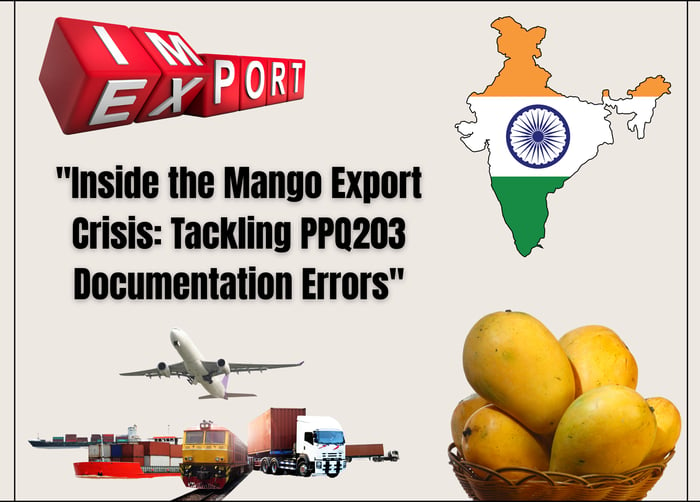
Inside India's Mango Export Crisis: Tackling PPQ203 Documentation Errors
INTERNATIONAL TRADE & TRADE POLICIES
GlobalSetu Enterprise [V.S.V]
5/18/20253 min read


India is renowned for its premium mangoes, cherished both domestically and abroad. However, recent setbacks in the export market have thrown a spotlight on the intricate challenges faced by mango exporters. In this blog, we delve into the causes of shipment rejections, the economic impact of these errors, and the potential solutions needed to safeguard one of India’s most celebrated agricultural exports.
The Journey of Indian Mangoes in Global Markets
Indian mangoes have long been a symbol of quality and tropical flavor, making them a popular choice in global markets. As demand has grown—especially in countries like the United States—exporters have scaled up production and distribution efforts. Yet, with expansion comes an increased need for strict adherence to international regulations. Recent events, however, have highlighted vulnerabilities in the export process that could affect the country's reputation and economic viability in the global mango market.
Understanding the Irradiation Process and the PPQ203 Form
To meet stringent import requirements, particularly for the U.S. market, mango shipments must undergo a mandatory irradiation process. This treatment is intended to eliminate pests without compromising the fruit’s quality. One critical piece of documentation is the PPQ203 form, which certifies that the mangoes have been properly irradiated at approved facilities, such as those in Navi Mumbai where USDA officers oversee quality control.
The Crux: Documentation Errors and Their Implications
Despite the clear guidelines, recent reports indicate that 15 mango shipments were rejected due to errors in the PPQ203 documentation. In these cases, even minor discrepancies in the paperwork led to catastrophic outcomes:
Rejected Shipments: Exporters received notifications that their shipments did not meet the necessary documentation criteria.
Forced Destruction or Re-exportation: With the perishable nature of mangoes, exporters faced the difficult choice of destroying the affected shipments or incurring high costs to re-export them.
Estimated Losses: Preliminary estimates suggest that these errors contributed to losses of around $500,000, underscoring the dire financial consequences of lapses in documentation.
Economic Impact and Industry Repercussions
The fallout from these documentation errors extends far beyond the immediate financial losses. Key repercussions include:
Supply Chain Disruptions: Rejected shipments interrupt the supply chain, leading to overstock and wastage just as demand surges abroad.
Reputation Risks: Consistent errors can damage the credibility of Indian mangoes in competitive markets, potentially reducing future orders.
Increased Costs: The cost associated with re-exporting or destroying shipments adds pressure on already tight margins, further straining the industry.
Potential Solutions and Recommendations
To mitigate these challenges, industry stakeholders and government bodies must work together. Here are several strategic recommendations:
Strengthening Documentation Processes
Enhanced Training: Regular training programs for personnel at irradiation facilities and export offices can help ensure strict adherence to guidelines.
Standardized Checks: Implementing more rigorous, standardized pre-shipment checks for critical documents like the PPQ203 form can catch errors before shipments leave port.
Exploring Technological Interventions
Digital Verification Systems: Integrating blockchain or other digital technologies could streamline the verification process and reduce human error.
Real-Time Monitoring Tools: Utilizing software that tracks the documentation process in real time can flag discrepancies immediately, allowing for prompt corrections.
Diversifying Export Markets
Reducing Dependency: While the U.S. remains a lucrative market, diversifying into other regions can reduce the impact of errors tied to specific regulatory frameworks.
Government Intervention: Bodies such as APEDA and the Maharashtra State Agricultural Marketing Board (MSAMB) can play vital roles in coordinating efforts, offering technical support, and advocating for regulatory flexibility during transition phases.
Looking Ahead: A Collaborative Path Forward
For Indian mango exporters, the recent setbacks serve as a wake-up call. By embracing greater regulatory compliance, investing in technology, and leveraging government support, the industry can overcome these challenges and continue to thrive. The future of mango exports in India depends not only on the quality of the fruit but also on the precision and reliability of its journey from tree to table.
Conclusion
India’s mango export industry stands at a crossroads. While documentation errors involving the critical PPQ203 form have led to significant financial and reputational damages, they also offer an opportunity for systemic improvements. With focused efforts on standardizing processes, integrating new technologies, and engaging robustly with government agencies, the industry can restore its competitive edge and continue celebrating the legacy of Indian mangoes on the global stage.
Stay tuned for more updates as stakeholders and policymakers work collaboratively to address these challenges and secure a bright future for India’s mango exports.
GlobalSetu Enterprise
"A Bridge to Global Prosperity"
Mumbai, Maharashtra, India
We’re Here to Help! At GlobalSetu Enterprise, we value communication and collaboration. Whether you have questions about our products and services, want to discuss business opportunities, or simply wish to say hello don’t hesitate to reach out!